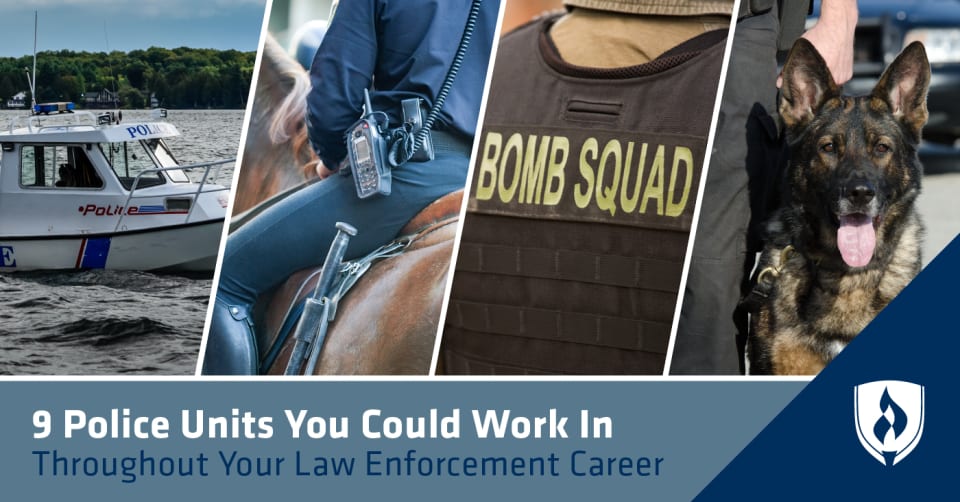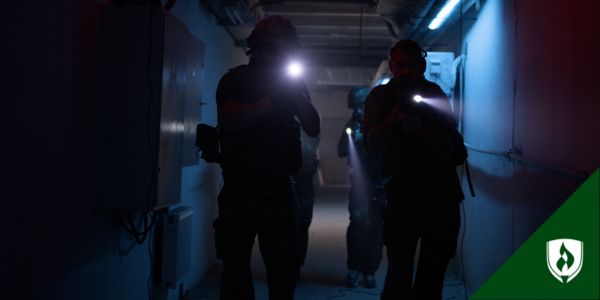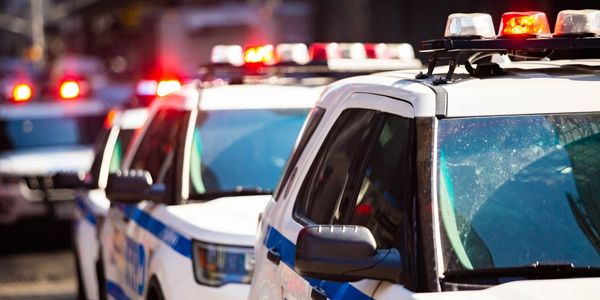9 Police Units You Could Work In Throughout Your Law Enforcement Career
By Brianna Flavin on 01/20/2020

Flashing lights, crime scenes, paperwork. Thanks to many media iterations, the general public can picture a few aspects of law enforcement. But unsurprisingly, those perceptions don’t really tell the whole story about what police officers do and just how many types of police officers there are.
This is especially true when it comes to police units. These smaller, more specified teams allow law enforcement officers to focus their work in a specific area they care about.
“My career has been enhanced by being part of a specialized unit that works together and trains together,” says Sergeant Rick Musson of Bozeman, Montana Police Department. “We experience camaraderie in a deep and personal way and have complete trust in each other.”
So what types of specialized police units are out there? In this article we’ll take a closer look at some of the common options you’ll find across the country.
9 Types of police units you could serve on
Are you curious about what types of police units are out there? Keep reading! These are some of the police units you could find yourself choosing from one day.
1. Traffic unit
When you think of law enforcement traffic units, the first things you might picture are speed traps and citations. And you aren’t far off—speeding accounts for the most traffic stops in the U.S.1 But there’s more to the role than just getting drivers to slow down.
“I worked in the traffic unit on a motorcycle for several years,” Musson says. “The primary purpose is for traffic enforcement and crash investigation. The goal of traffic enforcement is to make the community safer to live and drive in.”
Musson explains that he focused on areas where a high rate of accidents or serious crashes happened. “My goal was to lower the number of crashes through enforcement, education of the public, and working with those engineering roadways.”
While this can vary depending on the department you work for, motorcycle-based officers in this unit might get to take their vehicles home each day. Additionally, established traffic police may have the opportunity work more traditional hours to follow heavy traffic on weekdays.
2. Aviation unit
If you’ve ever seen televised footage of a manhunt or a search and rescue, you know helicopters sometimes get involved in police work. But other forms of aviation might also be part of these police units’ job description.
As you might imagine, the average police department doesn't typically have its own helipad or aviation equipment. These police units primarily exist in larger cities and state-level agencies. They respond to in-progress crimes, assist in the search for missing persons, and conduct routine patrol flights. Officers in these roles need a pilot’s license and specialized training.
When they aren’t needed elsewhere, aviation units might also join forces with other organizations. The Joint Aviation department of Gainesville, Florida, also works with the Department of Homeland Security, assesses storm damage and assists with forest fires. The Aviation Division of Riverside, California, also acts as an aerial command post with an array of multi-frequency radios in times of natural disaster, evacuation or mass civil unrest.
3. Bomb squad
The red wire or the green one? You might imagine police bomb unit officers decked out in protective gear, hunkered over a lethal device whose clock is ticking down. We’ve all seen the hyper-dramatic scenes in movies, watching in awe as some steel-nerved officer makes a bold decision in hopes of saving lives. While these depictions may not be completely out of the realm of possibility, the work of a bomb squad officer tends to be a few notches less intense than a Hollywood thriller.
As you might expect, these are the officers called to the scene when there’s a reasonable suspicion of a bomb being present—that can stem from phoned-in bomb threats to suspicious packages being found in public spaces. They’ll work with specialized equipment like bomb disposal drones to secure and, if needed, safely detonate suspected bombs. But that’s not all they may have on their list of potential responsibilities.
The City of Columbia, South Carolina’s bomb unit responds to calls and threats related to bombing as well as investigating scenes after an explosion has occurred. The team also deals with situations involving hazardous waste, suspicious packages and old or misplaced explosive material.
They may also assist other departments in safely disposing of evidence and weapons, and provide security against bomb concerns for dignitaries and events, according to the explosive ordnance disposal unit of Albuquerque, New Mexico, Police Department.
4. K-9 unit
K-9 units involve highly trained canines and their officer handlers. The dogs are deployed in a variety of situations, according to Jackson County, Missouri’s K-9 unit. They can apprehend fleeing suspects, protect the handler and other officers, and search for evidence, suspects and lost persons.
The Woodbury, Minnesota, Police Department’s K-9 unit utilizes dogs to search buildings and detect drugs as well as in community events and fairs to encourage the public to interact with the police department. These canines might also be deployed to search for explosives or chemical residue and assist other departments when needed.
5. Mounted police unit
These officers might be mounted on motorcycles, ATVs, bicycles or horses. The agility and terrain abilities of mounted police allow them to get places a car or other emergency vehicles can’t. For this reason, mounted police are often the first responders at the scene of an accident or crime. Officers on horseback are often called in for scenarios involving crowds since they can more easily maneuver in a heavily-populated area.
6. Harbor or marine patrol unit
These police units provide marine law enforcement, rescue and assistance—often via boat or other watercraft. They investigate accidents and crimes that occur on the water and perform dive searches and boater-safety tasks. Officers in these roles might find themselves covering coastal areas as well as rivers, lakes and other freshwater bodies of water.
Diving for evidence and missing persons is part of the job for Port of San Diego’s Harbor Police. They also respond to fires, detect underwater explosions and partner with other organizations to plan against a mass casualty event on the water. Austin, Texas’ Lake Patrol unit also monitors lakes for illegal bridge jumping, illegal waste dumping and watercraft usage laws.
7. Cybercrime unit
Nearly every crime has a cyber component, according to the International Association of Police Chiefs (IAPC). A police department could face crimes that involve digital activity, like embezzlement, or more directly digital crimes like hacking or “swatting.”
According to the IAPC, it’s possible for police departments to hire civilians for some of the work in a cybercrime unit if they can be under the direct supervision of a law enforcement officer. But larger departments will likely have cybercrime units fully operated by police officers.
New York State’s computer crime unit keeps busy tracking criminal activity as well as solving crimes in which computers or other digital components were involved. They also conduct presentations and provide education on internet safety, identity theft and computer security.
8. Animal control (or animal protection) unit
What would you do if you woke up one day to find a bear chilling in your garage? If call the police was your answer, you’d probably get a chance to meet the animal control unit. These police units (also called animal protection units) deal with scenarios where animals are in danger or are endangering civilians.
Depending on where they are located, the job description could be really different, but they can respond to anything from stray pets, to concerns about rabid wildlife, to dogs locked in hot cars. The Animal Control unit of Bloomington, Minnesota, dispatches officers over reports of animal cruelty and neglect as well as to collect and relocate animals who need to find their homes or natural habitats.
The Animal Control Section of Santa Monica, California, also monitors dog parks, runs an animal shelter and conducts animal licensing inspections. These units might also get involved in health and safety code violations involving animals, as well as track down animals who have bitten humans.
9. SWAT (special weapons and tactics)
SWAT teams are focused on tactical solutions more than other law enforcement priorities like investigation. These units exist to increase the probability of safely resolving critical incidents and to provide a systematic approach to saving lives, according to The National Tactical Officers Association.
“Our mission is to save lives,” Musson says. “Police deal with dangerous situations daily but when situations rise above patrol’s capabilities and training to deal with, specialized units are tasked with handling those situations.” Musson explains that officers all try to save lives, but that SWAT takes those plans and strategies to a deeper level.
Musson says officers on the special response team don’t get incentives from his department aside from training-based overtime hours—they join because they care about the specialized skills that can help them save the lives of citizens and fellow officers. “Being part of the team gives me specialized training in tactics and firearms, so I can do my job better not just on the SWAT team, but also as a patrol officer.”
Are you interested in joining a specialized police unit?
As you can see, there are many ways to be a police officer. These police units certainly don’t cover the full spectrum of opportunities out there. Detectives, for example, have several specializations available just in their branch of law enforcement. So if seeing some of these options gets you excited, you should absolutely research further.
Keep in mind, before you can join a high-specialized police unit you’ll usually need some experience first. Musson says his department policy allows officers to be part of specialized units after two to four years on the job, depending on the unit. Additionally, some police units attract candidates who aren’t in law enforcement at all, but they do have the right background for a certain kind of specialized unit—such as cybercrime or aviation.
If you can picture yourself serving in one of these specialized roles, you’ll first want to know what becoming a police officer takes. Learn more about the process in our article, “How to Become a Police Officer: Your Step-by-Step Guide.”
Another specialization to check out is conservation officer. What does a conservation officer do? Learn more in our article.
1Bureau of Justice Statistics, U.S. Department of Justice, Special Report: Contacts Between Police and the Public, 2015 [accessed December, 2019] https://www.bjs.gov/content/pub/pdf/cpp15.pdf
Professional Peace Officer Education (PPOE): Rasmussen College's Law Enforcement program meets standards established by the Minnesota Peace Officer Standards and Training Board (MN POST) for persons who seek employment in Minnesota as a peace officer.
Graduates of this program may need to successfully complete additional academic coursework, training, practical/skills, and fitness standards before becoming eligible to sit for the MN Peace Officer Licensing Exam.
This program is not aligned to the standards of any professional licensing body other than the MN POST, and is not intended to satisfy professional licensure requirements of any professional licensing agency in any other state.




